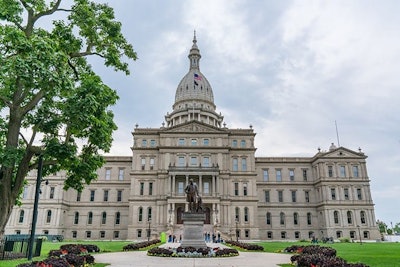
Michigan regulators have unveiled plans to launch adult-use cannabis sales in the state Dec. 1, although recreational business licenses have yet to be issued and supply may be limited as the market finds its footing.
The Marijuana Regulatory Agency announced Nov. 13 that the licensed medical cannabis businesses in the state that have applied for adult-use licenses can sell up to half their inventory to the adult-use market starting Dec. 1, according to an MLive.com report. However, products must have been in the business’s inventory for at least 30 days before being transferred to adult-use customers, the news outlet reported.
Michigan began accepting adult-use cannabis business licenses Nov. 1 and plans to award the first licenses by the end of the month.
Emergency rules for the state’s adult-use market were issued in July and remain in effect until Jan. 3, 2020, according to the Department of Licensing and Regulatory Affairs (LARA) website.
According to Matthew Abel, attorney for Michigan-based Cannabis Counsel P.L.C., executive director for Michigan NORML and a member of the Board of Directors for MI Legalize, there may be some retailers selling to the adult-use market on Dec. 1, but products may be hard to come by at first as businesses make the transition.
“I think the recreational marijuana that’s sold in the beginning will be quite expensive as long as demand outpaces supply,” Abel told Cannabis Business Times. “Eventually, the supply will catch up to the demand, but it’s likely to be many months before that happens.”
Supply has already been an issue in Michigan’s medical cannabis market, with some businesses reporting shortages in some parts of the state. Caregivers, once allowed to sell their products freely to the state’s licensed dispensaries, were barred from this practice in the spring by regulators. After public outcry, the state compromised and allowed caregivers to sell to licensed growers and processors, who would then test the products as part of the Metrc seed-to-sale tracking system and then sell the products to retailers, as long as they passed testing.
“That was to prevent the shortages in the medical market,” Abel said. “The caregivers still are selling to the growers and processors, so apparently, there’s not enough licensed medical [cannabis] to satisfy the market, but we’re allowing those that are licensed to sell rec. It seems like they’re trying to have it both ways.”
Supply may also be affected by municipalities’ bans on adult-use sales within their jurisdictions. A provision in the law allows communities to opt out of hosting adult-use cannabis businesses, and Detroit recently joined roughly 1,400 of Michigan’s 1,773 cities, townships and villages that have prohibited adult-use cannabis facilities, according to a Detroit Metro Times report.
Still, just over a year after voters approved legalization, the state is moving to get on with adult-use sales.
“Maybe they’re just testing the waters to see how much demand there is,” Abel said, adding that anytime he speaks publicly, he receives questions about when adults will be able to purchase cannabis at retail outlets.
“People are definitely interested in buying,” he said.
Michigan regulators are also working through permanent rules for the adult-use market, which will take effect when the emergency rules expire in January, Abel added.
In the meantime, he wonders about the impact an adult-use market could have on the state’s medical supply, which is already lacking.
“I’m concerned it’s going to have a chilling effect on production of medical marijuana,” he said. “They’re going to produce it, but then they’re going to sit on it for 30 days. They could sell it all today as medical, but if they sit on it for 30 days, they can sell half of it for rec. It may have the unintended consequence of actually reducing the supply temporarily.”
In any case, the state continues to work toward its goal of awarding its first adult-use licenses by the end of the month.
“There’s just a lot that’s up in the air right now,” Abel said, “but at least the state is working diligently to process the applications, so we appreciate that."

























